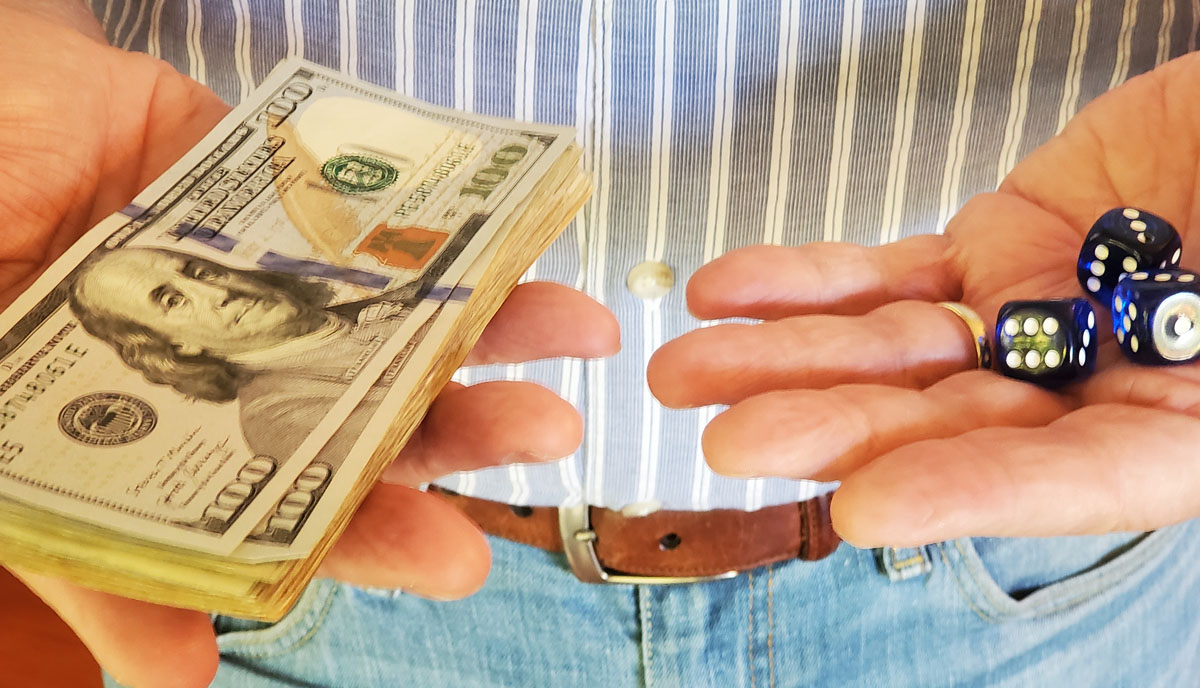When I attend a meeting on investing for physicians, I am surprised at how often a deal is offered that is pure speculation, and not a solid investment. My track record on making good returns from speculating is abysmal. But I have seldom lost money when I chose a solid investment.
That begs the question of when something is a solid investment vs when a deal should be considered speculation. The answer to this question should be right on the tip of the tongue of every investor. When we think we are making a good investment, but what we are actually putting our money into is a very speculative deal, we are poised to lose a large chunk of our wealth.
Following is how to tell the difference between speculating and investing. I’ll pull back the curtain on a few times when I speculated earlier in my life, before I know better. Spoiler alert, it didn’t turn out well.
Speculating vs Investing
Once a person gets acquainted with the differences between speculating and investing, it becomes very easy to say no to speculation. A good rule of thumb is to think about the requirements for the desired outcome. If the outcome will only be favorable if a few parameters go your way, then you are talking about speculation. If the outcome is not very affected by outside parameters, then you are talking about investing.
Let’s look at two real estate deals as an example. The first is a fixer small apartment building you are considering buying with an adjustable-rate mortgage (ARM). Your plan is to kick out all the tenants, renovate, rent out the units at a higher rate, and then sell the apartment building for a handsome profit.
In order for this short-term deal to turn out well, several things must happen in your favor. First, the interest rate must not go up resulting in an increased mortgage payment. Then the rehab estimates must be accurate with no additional problems turning up during the renovation. Then you must be able to rent all the renovated units at the new higher price. Finally, the real estate market must allow for a quick sale at the new higher price. If any of these things don’t work out well, there could be problems recovering your money, let alone making a profit.
Contrast that speculative deal with buying a small apartment with a 30-year owner carry note at a fixed rate that needs no renovation and currently has no vacancies. You plan to own this apartment building for the rest of your life. It currently has a $2,000 a month positive cash flow. You are not relying on anything to happen before this investment will give you a positive cash flow. Its current cashflow is expected to increase through time for many years.
The first deal, a fix and flip, is a speculation that requires things out of your control to go well to make a good profit. The second deal, buy and hold for a long period, is an investment that will likely perform as expected.
I love the quote from Mark Twain on speculation:
There are two times when a man should not speculate:
When he can’t afford it and when he can.
Here are a few examples of the differences between Speculating and solid Investing:
Speculating is almost always short term; Investing is almost always long term.
Speculators are watching the market daily, but Investors rarely need to look at the market.
Speculating focuses on high reward and ignores risk, while Investing focuses on a good reward while minimizing risk.
Speculators work on timing the market, but Investors work on time in the market.
Speculating is the hope of making a big killing. Investing is a near assurance of turning a profit.
Speculators buy a piece of empty land hoping the city will move towards it and the land will go up in value; Investors buy a developed rental that spins off profit from day one.
Speculating is exciting where Investing is boring.
Speculating is flipping property, while Investing is buy and hold.
Speculators often need adjustable-rate mortgages (ARM) to make their deal work, but Investors only use fixed mortgages with long terms.
Speculators are going for the home run, while Investors are trying to preserve capital and grow it steadily by hitting reliable singles and doubles.
Speculators write about what to do in the current market conditions, but Investors use the same safe rules in all market conditions.
Speculators crave adrenaline, while investors search for safety.
As I think back on my investing history over the years, I can’t think of a single time I speculated and made good money. The odds are just not in our favor when speculating. Once I stopped speculating, I never paid any attention to the market. I recently was a speaker at a conference and heard one of the other speakers discuss the current market conditions. He showed a slide of the Dow Jones Industrial Average and it was over 42k. I remember thinking that the last time I saw the DJIA it was 28k. I just don’t use any of my time chasing the market. Because nothing I do is dependent on the current market conditions.
Here are a few examples when I got excited about a deal, (If you are excited it is likely because you are speculating) and it didn’t turn out as planned. In hindsight, I should have seen it coming.
The hot new star
Years ago, I read an article about the new CEO of a small chain of fast-food restaurants. He was on the cover of a magazine I read regularly looking to find my next great investment. He was said to be the next great super star, and his company will be the next McDonalds. We all know how great it would have been to be on the ground floor of McDonalds.
I got excited about his new plans for the company and bought some stock. My investment doubled in a couple of weeks. I felt so smart for investing in this up and coming restaurant. After seeing such good results so quickly I got excited about its future and invested even more money in this promising company. I also talked others into investing in this new super-hot deal. The price doubled again. After a few months my investment had substantially increased in value.
Then the stock dropped in price. I saw this as an opportunity to get more great stock at a bargain price. Then the stock dropped precipitously to near zero. They did a 10 to 1 reverse split to raise the price of each share so it didn’t look so low. It fell some more and they had a 100 to 1 reverse split.
Today I own less than 20 shares of stock in this company due to all the reverse splits and each share is worth zero. I lost everything I put into this even though the franchise is still in business, and I can still eat there.
So why was this speculating? It was a hot new guy with big plans. The profits depended on him doing what he said he would do to make the company as big as McDonalds. He ended up diverting from his original plans. His idea for expansion was never implemented. I jumped on this because I saw it in a magazine, which means the ground floor opportunity has already passed. Now it depended on the future growth of a fairly small and new company, and I had no control over how well it did.
The fix and flip
In 2007 the real estate market was super-hot. People were buying property sight unseen and flipping it a few months later for big profits. I decided to abandon my buy and hold strategy and do one of these fix and flip deals. I also wanted to bring in my extended family and show them how to make money in real estate.
After the partners formed an LLC, I found a promising fixer, a 9-unit apartment complex. We bought it with the notion that we would fix up the property, raise the rents and sell it in 3-5 years for a great profit. Everyone was on board since they could see my great track record in the buy and hold real estate deals I had already made.
Then, in 2008, the real estate market collapsed. We were under water in this investment as its value was now less than the mortgage. We would not be able to do the quick flip for a handsome profit. Our plan was totally dependent on a continued rapidly rising market.
Fortunately, I purchased it using the same long term financing techniques I had used for all my other successful real estate deals. Because of good financing, even though the property was under water, it still had a positive cash flow. We would have to ride it out and sell it sometime after the market recovered. We sold it at the 12-year mark for a good profit, seven years later than we planned.
Had I purchased it with short-term financing, justified because we were doing a short-term flipping deal, we might have been in big trouble and may have even lost the property when refinancing was required due to the property value drop. This short-term financing tragedy happened to so many real estate speculators following the 2008 crash.
My friend needs capital for his great new business
I don’t know how many times I have advised people to not invest in businesses to help a friend, yet I did it myself.
One day a friend came to me to talk about investing in his company. His candy manufacturing company had been running for a few years producing a great product and the candy was selling well. He wanted to raise enough capital to move to a bigger factory. He was offering shares to some of his friends.
Initially as I contemplated this, I said no, this is way too risky (speculative) for me. But then I began to think about diversification; I didn’t own anything in the candy/food industry. I also saw the opportunity to hit a home run. So, against my better judgement, I decided to go for it. Later the company needed more money for another expansion. Again, I provided more capital, in addition to other investors who purchased additional shares.
The bottom line was after a decade in the candy business, we still had not made any profit, despite selling $2M in candy per year. Eventually the company closed its doors, and the value of our substantial investment was lost completely. This was the single largest investment I had ever made, and the largest loss.
All startup companies are speculations; they do not have a track record of making profit. Something like 75% of those start-ups will fail. Speculating on a start-up means taking a 75% risk of losing money. That doesn’t sound like investing to me. Any company in need of more capital is in trouble. Putting more money into a “promising” company that has not yet earned any profits is not a good investment. I was swinging for a home run, but instead, stuck out.
So why do people keep speculating? Because they heard of a guy who won big. Someone wins now and then, and that entices the rest of us to go for it. The same reason people buy lottery tickets even though the chance of winning is abysmal: Someone won millions last month and next month it could be me. But the math just doesn’t support speculating.
They say that good judgement comes from experience, and experience comes from bad judgement. Build off my bad judgement, there is no need to experience bad judgement yourself.
I could go on with other times I have forgotten to follow my own advice. Don’t speculate with your money. Make sound, solid investments with a high probability of profits. Get your excitement from fun activities, not from speculating with your hard-earned money.





